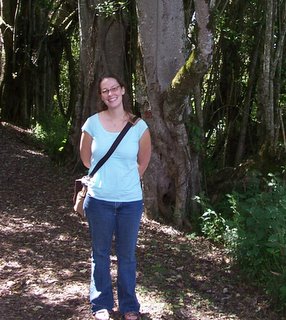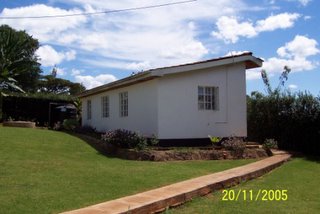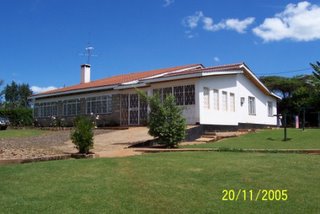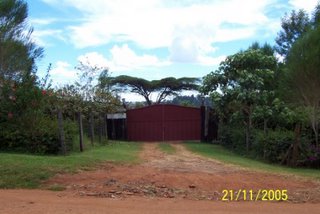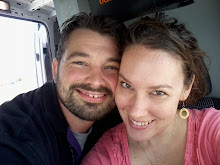The caravan comprising of our blue ’84 Daihatsu and silver ’99 Toyota pick up truck rumbled out of the driveway of the Children’s Home in Kitale at about 9:15 am Sunday morning. We were on our way to Bugoma, a village about 60 kilometers from Kitale, for church. Church in the village is an experience that cannot be imitated anywhere.
After riding on dusty, pot-hole ridden dirt roads, listening to the only tap we have, the “WOW Gold Album,” for about two hours, we arrived at our destination.
The countryside we have just driven through is absolutely beautiful—almost indescribable. Rolling hills of farmland, dotted with tall, beautiful Acacia trees and other African greenery greeted us at every turn. Flowers of all sorts, in different shapes, sizes and colors beamed at us from the side of the road, as if welcoming us into their nook of the world. As we neared the village we had passed a field brimming with sunflowers that were on the verge of blooming into full force. It is nearing the end of November here in Africa, which means summer is just around the corner.
We pull into a yard that has a few mud buildings around the perimeter. The closest one to us is the church building, which, with its mud walls and sheet metal roof, we consider quite sophisticated for an African church. (Last week we met under a tarp made out of sewn-together rice bags, which did not hold up when the torrential rains came in the middle of the sermon!) As we unfolded ourselves from the trucks, we were met with broad smiles and warm hugs and hand shakes from many of the church members. “Welcome, welcome! I love you,” our first greeter exclaimed. This was the first time we had been welcomed with such outright veracity from a stranger. We soon learned her name, Christine, as she ushered us away from the church building toward another, which turned out to be her home. We sat down on hard, wooden furniture covered with embroidered pieces of fabric, kind of like doilies. After a short wait, Christine brought us mugs, cocoa mix, sugar, and hot milk, accompanied by bread and some traditional African sweet breads, known as mandazi. We made our own cocoa and munched on the breads. By this time, it was already after 11:00 am, and church hadn’t even started yet. We knew it would be a long time before lunch! Christine’s home was very nice for a village home. It was very large, about 800 square feet, with a few different rooms. The walls and floor were mud, and the ceiling was sheet metal, held up with beams made out of small trees. She had windows that closed with small wooden doors, and had managed to hang framed pictures of her family along the main wall of her living room. She had swatches of material that resembled valances hung along the top of the walls. As I observed her decorating I smiled as I thought, women are women, no matter if they live in mansions, ranch houses, or mud huts! After our mid-morning “tea” time, we walked back across the field for church. Many of the members were already seated on the narrow benches waiting to begin, women on one side, men on the other, children in the front, on the women’s side. We, as the guests of honor, took the chairs (with backs on them!) in the front of the room on the men’s side. While it felt a little uncomfortable to be sitting smack dab in front of all those strangers, here in Africa it is a sign of utmost respect to put the visitors at the front of the room.
The service began with a gust of singing. The songs were a capella, usually with a woman leading by singing a phrase and the rest of the congregation following. We clapped along with almost every song, which was good, since they were all in Swahili and we couldn’t sing along! After a bit of singing and an opening prayer, they had us introduce ourselves. We had come along with four church leaders, Johnston & Elizabeth Kapa, who are leaders in the Kitale area churches, and James and William, two pastors from the Mbale, Uganda area who have been studying at a Bible school here in Kitale for the last six weeks. After the introductions were made, we sang a few more songs before James brought the message to us. He spoke in English while Johnston translated into Swahili. James is a very good preacher, which is good, because the typical African sermon lasts at least an hour! He spoke on the subject of Micah 6:8: “He has shown thee, o man, what is good: but to do justice and to love mercy, and to walk humbly with thy God.” The African style of preaching differs greatly from the American style. They expound on each aspect of the text so deeply, giving great historical background, reaching into other passages of scripture, as well as making each point relevant to the congregation’s current situation along the way. After each point is strongly made they state, “Buona oh safiwe,” which is echoed with a resounding “Amen!” from the congregation. (This means Praise God in Swahili.) About half way through the sermon, my backside started going numb, which I am starting to realize will be a normal feeling on Sundays from here on out. After the preaching, William got up and did a mini sermon on giving and tithing to the Lord. Everything important in Africa is repeated and illustrated in many different ways, to get the point across. For an American, this is difficult to get used to, as we are more familiar with the concept of saying it once and getting on with it so we can move on to the next thing. Time, over all, plays a much smaller role in the life of the African than that of the American. Church is the agenda for Sunday, and nothing else. (It’s a bit refreshing, actually!)
After the offering was taken, Greg was asked to get up and provide the talk for the communion. His “preaching” was a bit more brief than that of the two previous speakers, but I (and especially my backside) was very grateful. I wasn’t sure how much longer I could stand to sit on that hard chair in that hot room! After communion was passed and taken, Johnston and some of the local church leaders shared some encouraging words concerning the sermon and then Greg was asked again to approach the pulpit and share why we were here in Africa and what we will be doing over the next 2 years. The congregation was very grateful and pleased with our ministry and expressed that they would like to have us back to teach them about AIDS. So far we and our mission have received warm welcomes, which is very encouraging. After Greg shared, James ended the service with prayer and the service was over.
Many of the church members greeted us whole heartedly, shaking our hands and welcoming us whole-heartedly. As soon as I could, I dashed outside into the bright sunshine and light breeze and took a deep breath. Africa is so beautiful. The pastor of the church had a camera and before we knew it, Carrie and I were being pulled in every which direction by the women of the church wanted their picture taken with us. Greg and Kelly were virtually ignored, as us girls became their objects of affection. If you ever want to feel like a rock star, just come to Africa for a while and your desires will be fulfilled in no time!
When we were finally able to break loose from the haranguing mob, we were escorted back to the house we had taken cocoa in. One of the pastor’s daughter and another girl greeted us at the door with warm water and a basin to wash our hands with. We sat back down in the living room and a short time later, our meal was brought to us. Heaping bowls of white rice, beef with soup, sukuma weaky (cooked greens), ugali (the staple food of Kenya made out of corn meal), and chipati (flat bread) was spread before us. It was delicious! As we ate, we listened to the Kenyans talk with animation about the controversial elections that were to take place the next day. It was all in Swahili, so we had no idea what they were saying exactly, but we could catch a few choice words that clued us into their subject matter, at least. Not being able to partake in their conversation, either by hearing not by speaking, made me realize how central the ability to speak is to any society. I want so much to become fluent in their language; I feel lost without the ability to participate in conversation, even if it is just to hear and understand what is being said. After the meal was cleared, Christine brought us a plate of fresh cut avocados. Most of the produce in American cannot hold a candle to the fresh produce of East Africa. Oh la la! When we finally finished our glorious mid-afternoon meal, we graciously thanked the women who had prepared it for us and geared up to head home.
With every passing day in Africa (it has been 2 months already!) I feel more and more like this is a place where I could settle down for a while. There is something about this place and its people that are enticing and comfortable at the same time. There are many difficult aspects about life in Africa, which I will definitely expand on in another blog. Initially, however, I feel a great sense of fulfillment, enhanced by a sense of adventure and a huge amount of joy about being on this African road.
